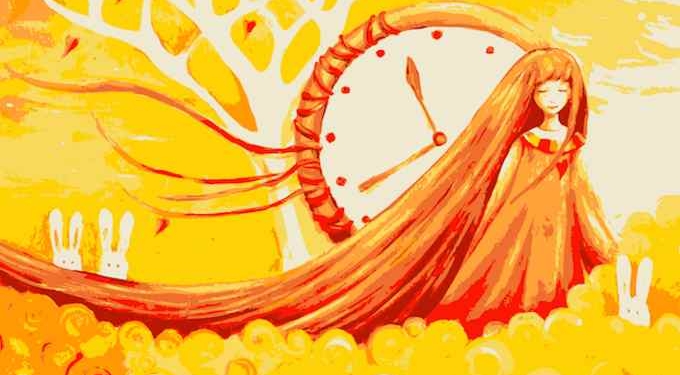
By Kerry Campbell | Tiny Buddha
“Patience is not the ability to wait, but the ability to keep a good attitude while waiting.” ~Joyce Meyer
I used to say, “Patience is a virtue I don’t have.” So, of course, that is how I lived my life. Hurried, exasperated, impatient, and stressed out.
Not only was I a creating a world where I was running around like a chicken with my head cut off—because everything had to be done now, and anything that got in the way of that had to be removed immediately—but I was creating this world for those around me.
My children often bore the brunt of my impatience. If they didn’t get dressed fast enough, or show up at the dinner table as soon as I called them, or get into the car when it was time to go, they met my wrath. And, I had a wicked tongue.
I was constantly haranguing them to stop “being lazy,” “quit dawdling,” etc. Somehow, their lack of speed equated into being lazy or “less than.” Where did I pick up such a mentality?
Do you find yourself constantly speeding to work, rushing through the grocery store, and generally snapping at people who can’t keep up? How does this make you feel inside?
For me, it made me feel wound up like a tight ball. I felt a constant sense of anxiety. And, it didn’t make me feel good about myself—certainly, my best self was not shining. Mostly, it made me feel chronically stressed out.
Researchers have recently been able to prove through MRI scans of peoples’ brains under stress that stress causes certain areas of the brain to shut off. This means there is less activity in the brain—which leads to a depressed brain. This also leads to an angry brain because there is less neurological activity happening to process things that are going on in your day-to-day life. It’s like a traffic jam in your brain that happens because you don’t have enough snowplows to clear the road.
This frustration can lead to a trigger-happy mouth—one that blurts out frustrations and snaps angrily at people. Because the brain is thinking so hard, it hurts!
This used to be my life: constant impatience and its ensuing anxiety > chronically stressed brain > chronic depression > inner rage and anger.
The thing with not having any patience is it clouds your entire life. You are so busy rushing from one thing to the next, expecting immediate gratification, that you are often not only disappointed but also emotionally and physically depleted.
What happens when you yell at your children to hurry up? You’re met with resistance, that’s what happens. They yell back—more stress. Or, they go even slower!
Does this resolve the issue in the end? No. It only makes matters worse. And, what was the issue in the end? I believe the issue was you had an attitude problem.
The attitude is this: I have so much to do I can’t possibly get everything done in the day. So, I must rush about doing everything so I can make good progress on my to-do list. If someone or something impedes my progress on my to-do list, I get angry because I can’t possibly get everything done.
It sounds like a vicious cycle, doesn’t it? The thing with being impatient is it is intimately tied to the judgmental and critical sides of ourselves. This is because whatever is happening at the moment is deemed not good enough in some way shape or form.
In this case, it’s not happening fast enough. The moment and what’s happening in it has been judged! And it has been criticized.
Once this occurs, suddenly you find yourself trying to control the situation and making it happen faster. When this doesn’t work—for example, if the person in front of you is driving really slowly—you get angry, which causes your cortisol stress levels to rise. And, we all know stress isn’t good for us.
So, how do you stop this vicious cycle and where do you find patience? I was at a loss, myself. I didn’t even realize I had a patience problem, because I was telling myself the story that I didn’t have any patience, to begin with. From this point of view, why bother since I didn’t have any?
Well, we believe what we tell ourselves, and if I keep saying I don’t have any patience, well then I won’t.
The first thing I needed to do was look at the story I was telling myself and change it. I began by saying to myself, “Patience is a virtue I practice daily.” It was a way to shift my mindset. Maybe I couldn’t jump straight to “I am the world’s most patient person” immediately. So, I found a middle group that shifted my old thinking into a different kind of habit.
I had to write this down. And, whenever I found myself a) telling myself I am not patient or b) in a situation where I was feeling impatient and starting to get frustrated, I’d repeat the mantra “Patience is a virtue I practice daily.” Thus, I could accept the situation as a learning experience for practicing the virtue of patience.
The other thing about patience is it allows you to slow down and actually experience the world. I used to be so concerned about getting to the next wherever I was going—finish a project at work, order off the menu, find a parking spot—that I never actually lived.
















Feels sorry reading your post. Anxiety is a mental pressure which communicates in stress, crabbiness, misgiving, or uneasiness. The mental pressure comes about either from a feeling of vulnerability about future or looming occasions or from a feeling of failure to control one’s condition or situation. Uneasiness is a characteristic enthusiastic reaction of individuals trying to survive and live easily. Anxiety is a consistent indication of mankind’s horrifying slightness and its utter impotence to master its own destiny. One can consult a Psychic like Voyance Direct( http://www.martine-voyance.com/consultation ) or Similar which they could find Online for help
Good information.